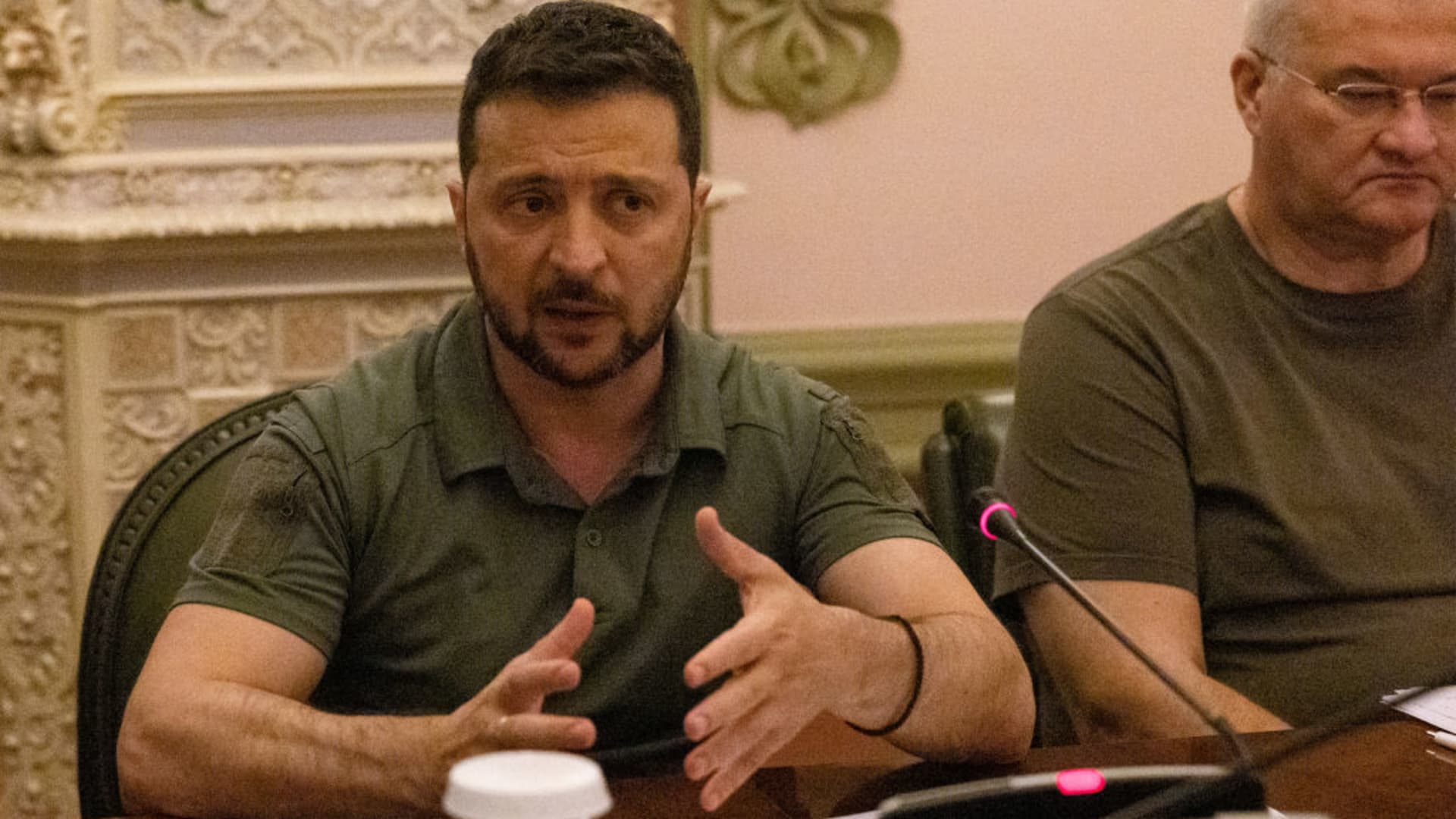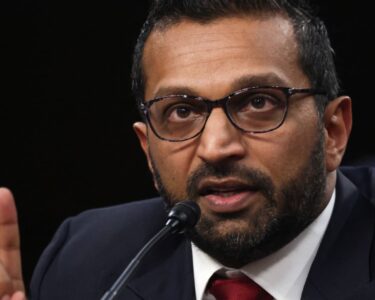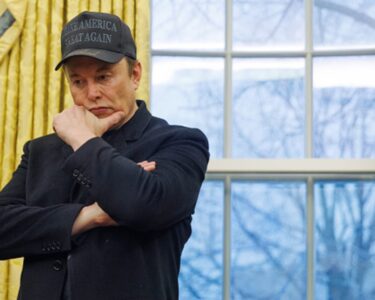This is CNBC’s live blog tracking developments on the war in Ukraine. See below for the latest updates.
Ukrainian President Volodymyr Zelenskyy on Friday announced the dismissal of ambassador to the U.K. Vadym Prystaiko after he called comments Zelenskyy made about the U.K. defense minister unhealthy.
Zelenskyy issued a presidential order in which he did not specify a reason.
In other news, Russian missile and drone strikes on southern Ukraine and port areas continued for a fourth night Thursday, according to Ukrainian authorities, as the White House confirmed Ukraine has begun using U.S.-supplied cluster bombs in its defensive operations in Russia-occupied areas.
National security spokesperson John Kirby told reporters the U.S. had received feedback that the munitions, which arrived from the U.S. last week, were being used “effectively.”
In his daily address, Zelenskyy said nearly 70 missiles were fired at Odesa, Donetsk, Mykolaiv, Zaporizhzhia, Zhytomyr and Kharkiv this week.
Since Monday, concerns have been growing over global food supplies following Russia’s suspension of the Black Sea Grain Initiative, which has provided a key export route since July 2022.
Wheat prices have moved sharply higher as the European Union’s foreign policy chief warned the move could imperil global food security.
Tensions are also mounting in the Black Sea after Russia said it would consider all vessels sailing toward Ukrainian ports on the Black Sea as military cargo carriers. Ukraine’s Defense Ministry said it “may” do the same from midnight Friday.
The United Nations Educational, Scientific and Cultural Organization, or UNESCO said that at least 270 cultural sites in Ukraine have been damaged due to the ongoing war.
“A preliminary assessment in Odesa has revealed damage to several museums inside the World Heritage property, including the Odesa Archaeological Museum, the Odesa Maritime Museum and the Odesa Literature Museum,” the U.N. agency wrote in a release.
“They had all been marked by UNESCO and local authorities with the Blue Shield, the distinctive emblem of the 1954 Hague Convention,” the agency added.
— Amanda Macias
The White House said it was closely watching Russian interactions with civilian ships in the Black Sea.
“Obviously, we continue to urge Russia to get back into the grain deal and we’re going to watch this very closely how they choose to behave here,” National Security Council spokesman John Kirby said on a conference call with reporters on Thursday.
“There’d be no basis whatsoever for an attack, on a legal basis, for an attack on a civilian ship making its way to the Ukrainian port to pick up food,” Kirby said, adding that he would not get into hypothetical scenarios.
Russia on Monday withdrew from the Black Sea Grain Initiative, a deal that created a maritime humanitarian corridor used to transport agricultural products from Ukraine to global destinations.
— Amanda Macias
Ukrainian President Volodymyr Zelenskyy thanked U.S. Senators Lindsey Graham and Richard Blumenthal for presenting a draft resolution that would support Kyiv’s early accession to the NATO alliance.
“The wider the space of NATO, the wider the space of peace and common security. Grateful to everyone who helps us protect freedom and bring a lasting, just peace closer,” Zelenskyy wrote on Twitter.
Ukraine has sought NATO membership since 2002. Last year, Zelenskyy applied for a fast-track membership to join the alliance. He has since visited several European capitals to garner support for Kyiv’s bid.
— Amanda Macias
The World Health Organization has recorded at least 1,067 attacks on vital health services in Ukraine since Russia’s late February invasion last year.
The World Health Organization’s Surveillance System for Attacks on Health Care estimates that healthcare facilities were damaged 952 times, ambulances were targeted in 124 cases and at least 284 attacks were carried out on crucial medical supplies. The surveillance system also estimated that attacks on health services led to at least 101 deaths and 139 injuries.
The Kremlin has maintained that its forces do not target civilian infrastructure like hospitals, schools and residential buildings.
— Amanda Macias
Former Vice President Mike Pence said the United States should continue to finance and support Ukraine as the country fights off a full-scale Russian invasion.
“I think America is the leader of the free world. We’re the arsenal of democracy and I believe it is in our national interest to provide the Ukrainian military what they need to repel that Russian invasion,” Pence told an audience attending a town hall meeting in Berlin, New Hampshire.
Last month, Pence made a surprise trip to Ukraine and met with Ukrainian President Volodymyr Zelenskyy. He was the first Republican presidential candidate to do so.
Pence said that he had “no doubt” Russian President Vladimir Putin would push his forces deeper into Europe if Kyiv fell to Moscow.
“I don’t want to see that happen,” Pence said, referencing his own family serving in uniform.
“I really do believe that by giving the Ukrainian military what they need to stop and repel that Russian invasion, we’re gonna prevent the day that the Russian military crosses the border,” he added.
The presidential hopeful also said he believed China was watching how the U.S. and its allies respond to Russia’s aggression.
“I don’t think there’s any more effective message to send to China about their military ambitions than to give Ukraine what they need to repel the Russian military. China’s watching,” Pence said.
— Amanda Macias
After quitting the Black Sea grain initiative, Russia is negotiating exports of food to countries in need but has not yet signed any contracts, according to Reuters reports citing Deputy Foreign Minister Sergei Vershinin.
Vershinin said there were no current talks on an alternative to the Black Sea grain deal and Russia was sticking with plans to compensate those countries for the grain they won’t receive now that it left the year-old deal, Reuters reported.
The Black Sea grain initiative, brokered by the United Nations and Turkey last July, allowed grain blocked by the conflict in Ukraine to be safely exported from Black Sea ports. Russia announced it was withdrawing from the deal on Monday.
— Melodie Warner
Kyiv’s counteroffensive was launched in June after months of preparation, but its progress has disappointed some onlookers who hoped for a faster regaining of Russian-occupied territory in the south and east of the country.
While Ukraine planned its counteroffensive over the winter — and waited for more military hardware from its international allies — Russian forces were heavily fortifying their positions along a 900-kilometer (559-mile) front line stretching from the Kharkiv-Luhansk border in the northeast of Ukraine, toward Kherson in the southwest.
Military analysts note that Ukraine now faces successive lines of Russian defenses that are, in some cases, 30 kilometers deep and consisting of minefields, anti-tank obstacles, and extensive networks of trenches and bunkers that are covered by Russian drones, artillery and helicopters.
Read the full story here.
— Holly Ellyatt
United Nations Under-Secretary-General Rosemary DiCarlo raised concerns about Russian threats to target civilian vessels navigating in the Black Sea and reports of newly placed sea mines that could pose a risk to civilian ships.
“Any risk of conflict spillover as a result of a military incident in the Black Sea, whether intentional or by accident, must be avoided at all costs, as this could result in potentially catastrophic consequences to us all,” DiCarlo said in remarks before the United Nations Security Council.
“The new wave of attacks on Ukrainian ports risks having far-reaching impacts on global food security, in particular, in developing countries,” she said.
She added that attacks on civilian infrastructure may also constitute a war crime.
— Amanda Macias
The International Atomic Energy Agency, or IAEA, said it is still waiting for Russian forces to grant access to the rooftops of the reactor buildings at the Zaporizhzhia nuclear power plant in order to carry out inspections.
IAEA Director General Rafael Mariano Grossi added that his team on the ground at Europe’s largest nuclear facility had not reported “any explosions over the past week.”
Grossi said the nuclear watchdog agency was also monitoring water levels at the facility following the destruction of the Kakhovka dam.
— Amanda Macias
Russian President Vladimir Putin on Friday claimed Ukraine’s counteroffensive operations had shown “no results, at least not yet,” and that the “colossal resources” provided by Western allies had not helped it.
“Today, it is clear that the Western curators of the Kyiv regime are clearly disappointed with the results of the so-called counteroffensive, which the current Ukrainian authorities have been loudly proclaiming in previous months,” Putin said in a Russian security council meeting, according to a Google translation.
“The whole world sees that the vaunted Western, supposedly invulnerable equipment is on fire.”
Kyiv launched a counteroffensive in June after months of preparation. It faces a 900-kilometer (559-mile) front line of occupied territory stretching from the Kharkiv-Luhansk border in the northeast of Ukraine, toward Kherson in the southwest.
Ukraine built up munitions supplies from the West, including U.S.-supplied cluster munitions. Russia has warned it has its own supply of the controversial weapons that it may also use in retaliation. Ukraine and groups including Human Rights Watch say Russia has already used cluster munitions in the conflict.
Kyiv’s Defense Ministry says its forces have liberated around 210 square kilometers (81 square miles) during the counteroffensive. CNBC could not independently verify these reports.
— Jenni Reid
Turkish President Recep Tayyip Erdoğan expressed confidence that the lapsed Ukraine grain deal can be revived, while urging the West to heed Russian President Vladimir Putin’s demands.
“I believe that we will ensure the continuation of the (grain corridor) by talking in detail with Mr. Putin. Western countries should take action regarding Putin’s expectations,” he said on Friday, as reported by Turkish state news agency Anadolu on Twitter, and according to a Google translation.
Turkey has been a key mediator of the U.N.-brokered Black Sea Grain Initiative. Russia pulled out of the agreement on Monday, sending wheat prices soaring, after multiple complaints that its own agricultural and fertilizer deliveries were being curtailed by Western restrictions.
Erdogan has since said he would attempt to bring Putin back to the negotiations table regarding the deal.
— Ruxandra Iordache
Ukrainian President Volodymyr Zelenskyy has removed Vadym Prystaiko from his role as Ukraine’s ambassador to the U.K., according to a presidential order cited by Reuters Friday.
No reason for the dismissal was provided in the order, which also dismissed Prystaiko as Ukraine’s representative to the International Maritime Organization.
In an interview with Sky News last week, Prystaiko said there was “a little bit of sarcasm” in Zelenskyy’s comment that he would wake up each morning and say thank you to U.K. Defense Secretary Ben Wallace. At a NATO summit in mid-July, Wallace said he believed that Ukraine’s allies wanted to “see gratitude” and that the U.K. was “not Amazon” when it comes to weapons delivery.
“I don’t believe that this sarcasm is healthy,” Prystaiko told Sky News. “We don’t have to show the Russians that we have something between us. They have to know that we are working together. If something happens, Ben can call me and tell me everything he wants.”
Prystaiko took on the role as ambassador in July 2020.
— Jenni Reid
Russia’s navy practiced live-firing missiles at surface targets from ships in the northwestern Black Sea, the Defense Ministry said Friday, according to a Google translation of a Telegram post.
It said its ships and aircraft had also rehearsed isolating areas it described as “temporarily closed to navigation,” after Russia earlier this week said it would consider any ships heading toward Ukrainian ports on the Black Sea as potential carriers of military equipment. It said its forces “carried out a set of measures to detain the offending ship.”
— Jenni Reid
Ukraine has begun using U.S.-supplied cluster munitions in the battlefield, the White House said Thursday.
“We have gotten some initial feedback from the Ukrainians, and they’re using them quite effectively,” national security spokesperson John Kirby said at a news briefing, Reuters reported.
More than 100 countries have pledged not to use the controversial weapons because of their wide and untargeted range and the long-term risk posed by undetonated devices.
Kyiv received a stockpile of cluster munitions from the U.S. last week.
Russian President Vladimir Putin warned on Sunday that Moscow has a “sufficient reserve” of cluster munitions that it could use in “tit-for-tat actions.”
Putin denied Russia has used cluster munitions so far in the conflict, despite accusations by Ukrainian President Volodymyr Zelenskyy and other groups that it has done so.
That comes as analysts say Ukraine’s counteroperations in Russian-occupied areas are facing growing challenges.
— Jenni Reid
Russian strikes on Ukrainian port cities continued for the fourth consecutive night, local authorities said Friday.
The regional governor of Odesa Oblast, Oleh Kiper, said on the Telegram messaging app that Russia fired missiles at Odesa, two of which hit a granary. The attack destroyed 100 tons of peas and 20 tons of barley and injured two, he said. CNBC has not independently verified the report.
Ukraine has reported dozens of Russian missile and drone strikes on its port cities this week, as tensions grow over global food supplies following the suspension of a key Black Sea export route. Russia has said the strikes are a retaliation against an attack on the Crimean bridge early Monday, which it blames on Ukraine.
— Jenni Reid
Wheat prices rose for the third consecutive day following tensions amid Russia’s withdrawal from the Black Sea Grain Initiative, an agreement that established a maritime humanitarian corridor.
What’s more, Russian forces have carried out several punishing rounds of missile and drone attacks against port and grain infrastructure.
Read the full story here.
— Amanda Macias
Russia continues to attack Ukraine ports, wheat prices soar as concerns for global food supplies rise






